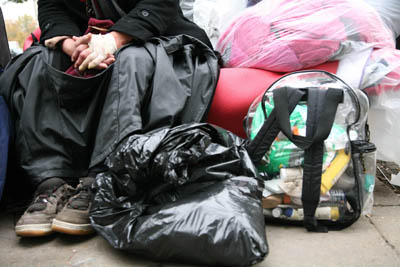
Here’s something everyone can “like”: Social media fosters community, even for those who don’t have a home.
A new study finds social media like Twitter and Facebook tear down economic and geographic barriers to help homeless people connect to their families and support networks.
The study was conducted by Art Jipson, a sociologist and criminologist at the University of Dayton, a Catholic school. Jipson says the findings present a new potential for Catholic social teaching.
“Catholic social teaching expresses a concern about ‘a communal, social nature’ where ‘we are called to reach out and build relationships of love and justice,’” Jipson said.
He cites “Rerum Novarum,” Pope Leo XIII’s 1891 encyclical on the duties of government and citizens in creating a just society, as the context and foundation of his work.
Jipson's study, “Shall I Paint You a Protest: Marxist Analysis of Social Media,” was presented August 17 at the annual meeting of the American Sociological Association in Denver.
He found that homeless people leverage free services like Facebook and Twitter to find food, shelter and job services, and to keep up with family and friends. All they need is a smart phone or public library with Internet access.
“People think of Facebook as this billion-dollar entity with stock offerings that sells gobs of advertising,” Jipson said. “But, on Facebook, the ‘least of our brothers,’ as it says in the Bible, have equal access to all of Facebook’s offerings and establish a sense of belonging that is based on more than possessions.”
Jipson created his study after a homeless man won a prize on Jipson’s weekly radio show. When Jipson hand-delivered the prize, a CD, he discovered the man used his smart phone to stream radio and connect with people on Facebook.
For the study, Jipson spoke with 14 homeless people about their social media usage.
“Why can’t I be on Facebook?” asked one subject in the study. “I have as much right to that as anyone else. Just because I am homeless does not mean that I don’t care about this stuff, you know? My family is on Facebook. My friends are on Facebook. People who care about me are on Facebook.”
Another interviewee said social media offered a judgment-free place to connect: “No one on the ‘net cares if I didn’t get a shower yesterday or smell some. They don’t judge me, you know? … I feel accepted. I am accepted.”
Sister Mary Ann Walsh, director of media relations for the U.S. Conference of Catholic Bishops, noted that advances in communications technology have created a more equitable sharing of the world’s resources, from the invention of the printing press to radio and television to the Internet.
Along the way, religion has made its mark on each platform, she said. The first book off Johannes Guttenberg’s press was the Bible. Archbishop Fulton J. Sheen hosted “The Catholic Hour” radio show and went on to host television programs.
New generations of Catholics can watch Sheen’s sermons on YouTube or download his radio addresses as podcasts. Or they can hear them over the USCCB website.
All these experiences, Jipson said, foster community.
“We assume that we have nothing in common with people who are different from us – by whatever means we might measure that difference,” Jipson said. “But a study like this demonstrates that we have more in common than we do in difference.”





